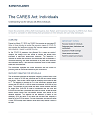COVID-19 Insights > CARES Act: Small Business Loans and Grants
CARES Act: Small Business Loans and Grants
Business Ownership
Review provisions for small businesses that include paycheck protections, loans and grants.
Passed on March 27, 2020, the CARES Act provides an estimated $2 trillion in fiscal stimulus to combat the economic impact of COVID-19 and provides the healthcare industry the financial support, equipment and protection it needs to combat the virus.
Below, review some of the major provisions in the CARES Act aimed at providing relief to small businesses.
Small business paycheck protections
Inside the relief bill, Congress has appropriated $349 billion in small business loans through the Small Business Administration (SBA) to help qualifying small businesses cover necessary business expenses, including payroll (from February 15 to June 30, 2020) for individual employees with compensation up to $100,000. This will help small businesses stay open and allow them to keep paying their employees to be ready to go back to work when this pandemic ends. The hope is with this assistance, employees will have enough resources to survive and they can go back to work. As per the 2018 Small Business Profile from the SBA, small businesses employ 58.9 million people, or 47.5% of U.S. employees. The effect of having that percentage of people not working or receiving a paycheck would decimate the economy.
Loan provisions
Small businesses are defined as having 500 or fewer employees, or a number chosen by the SBA. Certain businesses under the North American Industry Classification (NAIC) code 72, like restaurants and lodging operations that do not employ more than 500 employees per physical location, are eligible as well. The loans are up to 2.5 times the average monthly payroll cost in 2019, or up to $10 million. The maximum interest rate for these loans is 4% for up to 10 years. Payments for loans can be deferred for at least six months but no more than one year with no prepayment penalty.
Businesses can use these funds for group health benefits, payroll costs, interest payments on mortgages, rent, utilities, and interest on debt for expenses.
PPP loans
Paycheck Protection Program Loans, also known as PPP Loans, will charge interest at no more than 4% and will be administered by the Small Business Administration (SBA). Payment of interest, principal and fees will be deferred for at least six months but not more than 1 year. As the program’s name implies, PPP Loans are designed to provide cash to small businesses, including sole proprietors and independent contractors.
The following business types are eligible for a PPP loan:
- Businesses and entities must have been in operation on February 15, 2020.
- Businesses, nonprofits, veterans’ organizations, and tribunal concerns with fewer than 500 employees or the applicable industry size standard under SBA rules.
- Individuals who operate a sole proprietorship or as independent contractors and eligible self-employed individuals.
- Any business that employs not more than 500 employees per physical location of the business concern and that is assigned a NAICS code beginning with 72, for which the affiliation rules are waived.
- Affiliation rules are also waived for any business concern operating as a franchise that is assigned a franchise identifier code by the Administration, and company that receives funding through a Small Business Investment Company.
To learn more about an SBA loan, visit sba.gov.
Loan forgiveness
Loans can be forgiven if used for payroll costs, mortgage payments, rent payments and utility payments. Loan forgiveness will also be excluded from taxation. Small businesses must have maintained the same number of employees through the end of June 2020, otherwise the forgivable loan portion may be reduced. Reductions in the amount forgiven will also be applied if employees who make less than $100,000 have their compensation cut by more than 25%. Any layoffs that occurred prior to accepting the loan will not be subject penalties. But if those businesses rehire employees who were laid off after accepting the loan, they will receive additional credit to cover those wages.
Loan forgiveness will be issued by approved lenders. For details on the program, see the SBA or contact your local SBA-approved lending bank or financial institution.
Economic disaster loan and grants
The CARES Act expands access to Economic Injury Disaster Loans under Section 7(b)(2) of the Small Business Act. Loans are available for reasons other than payroll costs. This also allows for emergency grants in the form of an immediate advance of up to $10,000 if a business owner applies for a disaster loan, even if not approved for disaster loan.
This provision benefits those with existing SBA loans or new loans obtained within six months of the signing of the bill where the SBA will pay six months of principal, interest and fees on qualifying loans. Many states and municipalities are also imposing their own restrictions. If those moratoria are less strict, the federal moratorium would apply.
Treasury loans
For businesses with between 500 and 10,000 employees, the U.S. Treasury’s Exchange Stabilization Fund has set up direct loans to offset the effects of decreased revenues and keep people working. Interest rates on these loans is capped at 2% and borrowers can defer payments for a minimum of six months and up to one year. Businesses applying for loans:
- Must retain at least 90% of their staff at full compensation and benefits until September 30, 2020.
- Must restore at least 90% of their staff that existed on February 1, 2020, and restore all compensation and benefits to workers within four months of the end of the public health emergency.
- Must not outsource or offshore jobs for at least two years after repayment of the loan.
- Will not pay dividends to its stockholders or repurchase any equity security or its parent that is listed on a securities exchange while the loan is outstanding, except to the extent required under a contractual obligation in effect before the CARES Act was enacted. Businesses must not end collective bargaining agreements for at least two years after repayment of the loan, and must not block union organizing while the loan is outstanding.
Companies owned by the president, vice president and members of Congress or cabinet heads are not eligible for any loans.
Your financial advisor and tax professional can provide more information about how the CARES Act affects you directly.
Read the full whitepaper: The CARES Act: Small Business
Please note, changes in tax laws may occur at any time and could have a substantial impact upon each person’s situation. While we are familiar with the tax provisions of the issues presented herein, Raymond James Financial Advisors are not qualified to render advice on tax or legal matters. You should discuss tax or legal matters with the appropriate professional.
Links are being provided for information purposes only. Raymond James is not affiliated with and does not endorse, authorize or sponsor any of the listed websites or their respective sponsors. Raymond James is not responsible for the content of any website or the collection or use of information regarding any website’s users and/or members. Raymond James does not provide tax or legal services. Please discuss these matters with the appropriate professional.

 Maggie Slivinski
Maggie Slivinski Steve Corbo
Steve Corbo Alexandra Rao
Alexandra Rao Alexa Comey
Alexa Comey Gene Donato
Gene Donato Jack W. Kennedy III, CFP®, AAMS®
Jack W. Kennedy III, CFP®, AAMS® Henry (Hank) J. Schroeder, CFP®
Henry (Hank) J. Schroeder, CFP® Diane Gallagher
Diane Gallagher Scott Bernstiel
Scott Bernstiel Chrissy Carpenter
Chrissy Carpenter David Strout
David Strout Keith R. Hering AAMS®, CRPS®, CIMA®
Keith R. Hering AAMS®, CRPS®, CIMA®  Marjorie Onuwa
Marjorie Onuwa